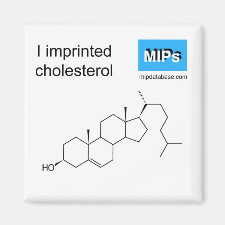
Authors: Asanuma H, Kakazu R, Shibata M, Hishiya T, Komiyama M
Article Title: Synthesis of molecularly imprinted polymer of b-cyclodextrin for the efficient recognition of cholesterol.
Publication date: 1998
Journal: Supramolecular Science
Volume: 5
Issue: (3-4)
Page numbers: 417-421.
DOI: 10.1016/S0968-5677(98)00042-X
Abstract: Polymeric receptors for cholesterol were synthesized by crosslinking beta-cyclodextrin (beta-CyD) with hexamethylene diisocyanate or toluene 2,4-diisocyanate in dimethyl sulfoxide (DMSO) in the presence of cholesterol as the template. Non-imprinted beta-CyD polymers were much poorer in the cholesterol adsorption. When beta-CyD was cross- linked by epichlorohydrin in aqueous alkaline solutions (even in the presence of cholesterol), the cholesterol adsorbing activity was nil. Use of DMSO as the cross-linking solvent is necessary for the imprinting, since beta-CyD molecules form inclusion complexes with cholesterol in this solvent and thus their mutual conformation in the polymer is regulated appropriately for cholesterol binding. The adsorbed cholesterol was completely removed from the polymers by treating the adducts with ethanol, indicating a strong potential for practical applications. (C) 1998 Published by Elsevier Science Limited. All rights reserved



Join the Society for Molecular Imprinting

New items RSS feed
Sign-up for e-mail updates:
Choose between receiving an occasional newsletter or more frequent e-mail alerts.
Click here to go to the sign-up page.
Is your name elemental or peptidic? Enter your name and find out by clicking either of the buttons below!
Other products you may like:
 MIPdatabase
MIPdatabase









